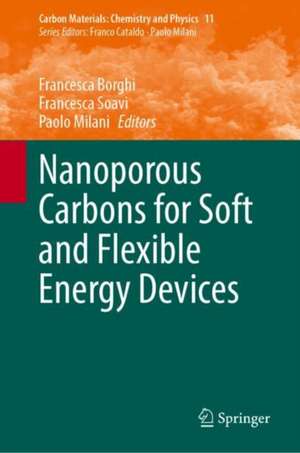Nanoporous Carbons for Soft and Flexible Energy Devices: Carbon Materials: Chemistry and Physics, cartea 11
Editat de Francesca Borghi, Francesca Soavi, Paolo Milanien Limba Engleză Hardback – 13 ian 2022
| Toate formatele și edițiile | Preț | Express |
|---|---|---|
| Paperback (1) | 939.77 lei 6-8 săpt. | |
| Springer International Publishing – 14 ian 2023 | 939.77 lei 6-8 săpt. | |
| Hardback (1) | 788.01 lei 38-44 zile | |
| Springer International Publishing – 13 ian 2022 | 788.01 lei 38-44 zile |
Preț: 788.01 lei
Preț vechi: 1036.86 lei
-24% Nou
Puncte Express: 1182
Preț estimativ în valută:
150.80€ • 163.75$ • 126.67£
150.80€ • 163.75$ • 126.67£
Carte tipărită la comandă
Livrare economică 18-24 aprilie
Preluare comenzi: 021 569.72.76
Specificații
ISBN-13: 9783030818265
ISBN-10: 3030818268
Pagini: 182
Ilustrații: X, 182 p. 1 illus.
Dimensiuni: 155 x 235 mm
Greutate: 0.48 kg
Ediția:1st ed. 2022
Editura: Springer International Publishing
Colecția Springer
Seria Carbon Materials: Chemistry and Physics
Locul publicării:Cham, Switzerland
ISBN-10: 3030818268
Pagini: 182
Ilustrații: X, 182 p. 1 illus.
Dimensiuni: 155 x 235 mm
Greutate: 0.48 kg
Ediția:1st ed. 2022
Editura: Springer International Publishing
Colecția Springer
Seria Carbon Materials: Chemistry and Physics
Locul publicării:Cham, Switzerland
Cuprins
Carbon Nanotubes for Flexible Fiber Batteries.- Carbon Nanotube Dual-Material Gate Devices for Flexible Electronics.- Integration of cost-efficient carbon electrodes into the development of microbial fuel cells.- Bridging electronics and micro energy storage.- Nanoporous Composite Sensors.- Laser-Induced Graphene and its applications in soft (bio)sensors.- Production of carbon nanofoam by pulsed laser deposition on flexible substrates.- Porosity of Nanostructured Carbon Thin Films.
Notă biografică
Francesca Borghi is a Post-doctoral researcher in the Department of Physics at the University of Milano, and at the Interdisciplinary Centre for Nanostructured Materials and Interfaces. She graduated in Physics in 2011 from the University of Milano, and after that obtained her PhD in Physics in 2015 from the same university. Her main work deals with the characterization of the interfacial chemico-physical properties of nanostructured thin films, produced by low-energy clusters beam deposition in the gas phase. In particular, she uses atomic force microscopy for the characterization of the first stage of growth of thin films in the sub-monolayer regime (metallic oxides, carbon, gold) and for the study of the structural and functional properties of granular thin films (surface charge density, elastic and electrical properties). In this frame, she won a national fellowship (Centro Universitario Cattolico) supporting the development of micro- and nano-structured networks for the characterization of the in-vitro behavior of spatially confined neuronal cells. Her research activity focuses also on the study of the structural, mechanical and electrical properties of ionic liquids confined in porous matrices. She also developed a new approach for the characterization of the surface area and porosity of thin films by adsorption gas measurements.
Francesca Soavi is an Associate Professor at the Department of Inorganic Chemistry "Giacomo Ciamician" of the University of Bologna. She graduated with a degree in Chemistry in 1996 and in 2002 received her PhD in Chemical Sciences, with a Thesis on “Electrochemistry of materials for Energy Conversion and Storage”. She is serving as a past-Chair of Division 3 'Electrochemical Energy Storage and Conversion' at the International Society of Electrochemistry. She is a co-author of more than 120 publications and she is involved in the knowledge transfer of research products by the StartUp BETTERY srl, that she co-founded in 2018. She has been awarded prestigious prizes in the context of electrochemistry of materials for energy storage/conversion devices. In 2019 she was the recipient of the Premio dei Premi prize awarded by COTEC-Fondazione per l’innovazione and the Senate of the Italian Republic.
Paolo Milani is a Full Professor in the Department of Physics at the University of Milano. He graduated in Physics from the University of Pavia (Italy) in 1984 and received his Docteur es Sciences (PhD) in 1991 from the Ecole Polytechnique Federale of Lausanne. In 1992, he founded the Molecular Beams and Nanocrystalline Materials Laboratory at the University of Milano. His research focuses on cluster-assembled nanostructured materials for neuromorphic systems, stretchable electronics, biomedicine and soft robotics. He has published more than 250 papers in peer-reviewed journals, several review papers and a monograph on supersonic cluster beam deposition for the synthesis of nanostructured thin films. Prof. Milani was the recipient of the U. Campisano Award, awarded to him from the Italian Institute for the Physics of Matter in 2000, for his contributions to the field of the synthesis and characterization of nanostructured materials. In 2006 he received the L. Tartufari Prize, awarded to him by the Lincei National Academy. Currently, Prof. Milani serves as the Director of the Interdisciplinary Center for Nanostructured Materials and Interfaces at the University of Milano.
Textul de pe ultima copertă
This book provides an interesting snapshot of new research within the fields of flexible and soft devices which use porous carbon-based materials. The increase in demand for soft and flexible electronics, electrochemical energy storage/conversion systems, piezoresistive pressure sensors has promoted the development of new strategies for the synthesis and integration of nanoporous carbon (NPC) into flexible and soft polymers and inorganic textures. The structural properties of such NPC materials combined with their mechanical, conductive and catalytic properties, show promising results for the technology they are designed for, which can be useful solutions in many other disciplines. An in-depth discussion of the use of NPC materials in different energy devices is provided in every chapter, while at the same time the knowledge of the reader on the various applications where these materials can be used will be broadened. This book sheds new light on nanoporous carbon-based materials and will be of great interest to graduate students and professionals working in this field.
Caracteristici
Enriches understanding of the use of porous carbon-based materials in energy devices Demonstrates that nanoporous carbon materials are excellent candidates for technological applications Features contributions of reputed authors who are experts in the field










